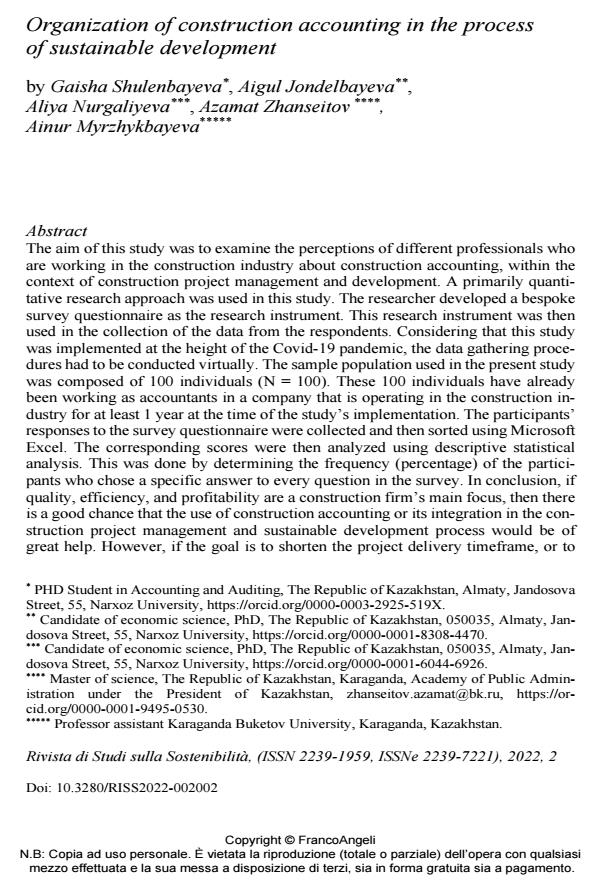Organization of construction accounting in the process of sustainable development
Titolo Rivista RIVISTA DI STUDI SULLA SOSTENIBILITA'
Autori/Curatori Gaisha Shulenbayeva, Aigul Jondelbayeva, Aliya Nurgaliyeva, Azamat Zhanseitov, Ainur Myrzhykbayeva
Anno di pubblicazione 2023 Fascicolo 2022/2
Lingua Inglese Numero pagine 18 P. 11-28 Dimensione file 201 KB
DOI 10.3280/RISS2022-002002
Il DOI è il codice a barre della proprietà intellettuale: per saperne di più
clicca qui
Qui sotto puoi vedere in anteprima la prima pagina di questo articolo.
Se questo articolo ti interessa, lo puoi acquistare (e scaricare in formato pdf) seguendo le facili indicazioni per acquistare il download credit. Acquista Download Credits per scaricare questo Articolo in formato PDF

FrancoAngeli è membro della Publishers International Linking Association, Inc (PILA), associazione indipendente e non profit per facilitare (attraverso i servizi tecnologici implementati da CrossRef.org) l’accesso degli studiosi ai contenuti digitali nelle pubblicazioni professionali e scientifiche.
The aim of this study was to examine the perceptions of different professionals who are working in the construction industry about construction accounting, within the context of construction project management and development. A primarily quantitative research approach was used in this study. The researcher developed a bespoke survey questionnaire as the research instrument. This research instrument was then used in the collection of the data from the respondents. Considering that this study was implemented at the height of the Covid-19 pandemic, the data gathering procedures had to be conducted virtually. The sample population used in the present study was composed of 100 individuals (N = 100). These 100 individu-als have already been working as accountants in a company that is operating in the construction industry for at least 1 year at the time of the study’s implementa-tion. The participants’ responses to the survey questionnaire were collected and then sorted using Microsoft Excel. The corresponding scores were then analyzed using descriptive statistical analysis. This was done by determining the frequency (percentage) of the participants who chose a specific answer to every question in the survey. In conclusion, if quality, efficiency, and profitability are a construction firm’s main focus, then there is a good chance that the use of construction ac-counting or its integration in the construction project management and sustainable development process would be of great help. However, if the goal is to shorten the project delivery timeframe, or to improve the project completion rates (i.e., productivity), then chances are the construction firms should stay away from con-struction accounting, at least at the moment.
Parole chiave:accounting, construction accounting, sustainability, development pro-cess, project management.
Gaisha Shulenbayeva, Aigul Jondelbayeva, Aliya Nurgaliyeva, Azamat Zhanseitov, Ainur Myrzhykbayeva, Organization of construction accounting in the process of sustainable development in "RIVISTA DI STUDI SULLA SOSTENIBILITA'" 2/2022, pp 11-28, DOI: 10.3280/RISS2022-002002